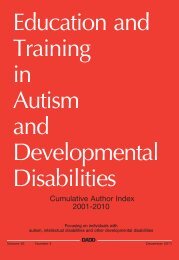etadd_47(3) - Division on Autism and Developmental Disabilities
etadd_47(3) - Division on Autism and Developmental Disabilities
etadd_47(3) - Division on Autism and Developmental Disabilities
You also want an ePaper? Increase the reach of your titles
YUMPU automatically turns print PDFs into web optimized ePapers that Google loves.
Browder, D. M., & Cooper-Duffy, K. (2003). Evidence-based<br />
practices for students with severe disabilities<br />
<strong>and</strong> the requirement for accountability in<br />
“No Child Left Behind.” Journal of Special Educati<strong>on</strong>,<br />
37, 157–163.<br />
Brown, L., McLean, M. B., Hamre-Nietupski, S.,<br />
Pumpian, I., Creto, N., & Grunewald, L. (1979).<br />
A strategy for developing chr<strong>on</strong>ological ageappropriate<br />
<strong>and</strong> functi<strong>on</strong>al curricular c<strong>on</strong>tent<br />
for severely h<strong>and</strong>icapped adolescents <strong>and</strong> young<br />
adults. Journal of Special Educati<strong>on</strong>, 13, 81–90.<br />
Brusling, C. (2005). Evidence-based practice in teaching<br />
<strong>and</strong> teacher educati<strong>on</strong>. Paper presented at the Professi<strong>on</strong>al<br />
Development of Teachers in a Lifel<strong>on</strong>g<br />
Perspective: Teacher Educati<strong>on</strong>, Knowledge Producti<strong>on</strong><br />
<strong>and</strong> Instituti<strong>on</strong>al Reform. Retrieved from<br />
www.cvustork.dk/agora<br />
Charmaz, K. (2005). Grounded theory in the 21st<br />
century: Applicati<strong>on</strong>s for advancing social justice<br />
studies. In N. K. Denzin & Y. S. Lincoln (Eds.),<br />
The Sage h<strong>and</strong>book of qualitative research (3rd ed.,<br />
pp. xix, 1210). Thous<strong>and</strong> Oaks, CA: Sage Publicati<strong>on</strong>s.<br />
Charmaz, K. (2005). Grounded theory in the 21st<br />
century. In N. K. Denzin & Y. S. Lincoln (Eds.),<br />
The Sage h<strong>and</strong>book of qualitative research (3rd ed.).<br />
Thous<strong>and</strong> Oaks, CA: Sage Publicati<strong>on</strong>s.<br />
Charmaz, K. (2006). C<strong>on</strong>structing grounded theory: a<br />
practical guide through qualitative analysis. Thous<strong>and</strong><br />
Oaks, CA: Sage Publicati<strong>on</strong>s.<br />
Chaudhry, V., & Owen, D. (2005). Examining inclusi<strong>on</strong>:<br />
Disability <strong>and</strong> community driven development.<br />
Social Development Notes, (100), 1–4.<br />
Retrieved from siteresources.worldbank.org/<br />
DISABILITY/Resources/280658-1172671461088/<br />
ExaminingInclusi<strong>on</strong>.pdf<br />
Cr<strong>on</strong>in, M. E. (1996). Life skills curriculum for<br />
students with learning disabilities. Journal of Learning<br />
<strong>Disabilities</strong>, 29, 53–68.<br />
Davies, P. (1999). What is evidence-based educati<strong>on</strong>?<br />
British Journal of Educati<strong>on</strong>al Studies, <str<strong>on</strong>g>47</str<strong>on</strong>g>, 108–<br />
121.<br />
Deku, P. (2002). Effects of training in communitybased<br />
rehabilitati<strong>on</strong> <strong>on</strong> attitudinal change of people<br />
toward people with disabilities. I F E PsychologIA,<br />
10, 175–184.<br />
Devlieger, P. J. (1994). Disability <strong>and</strong> community<br />
acti<strong>on</strong> in a Zimbabwean community: priorities<br />
based <strong>on</strong> a biocultural approach. Journal of the<br />
Steward Anthropological Society, 22, 41–57.<br />
Devlieger, P. J. (1999). Frames of reference in African<br />
proverbs <strong>on</strong> disability. Internati<strong>on</strong>al Journal of<br />
Disability, Development <strong>and</strong> Educati<strong>on</strong>, 46, 439–451.<br />
Dym<strong>on</strong>d, S. K., & Orelove, F. P. (2001). What c<strong>on</strong>stitutes<br />
effective curricula for students with severe<br />
disabilities? Excepti<strong>on</strong>ality, 9, 109–122.<br />
Eisner, E. (1965). Levels of curriculum <strong>and</strong> curric-<br />
ulum research. Elementary School Journal, 66, 155–<br />
162.<br />
Gagné, R. M. (1966). Curriculum Research <strong>and</strong> the<br />
Promoti<strong>on</strong> of Learning. Paper presented at the<br />
AERA Meeting.<br />
Glaser, B. G., & Strauss, A. L. (1967). The discovery of<br />
grounded theory: Strategies for qualitative research.<br />
New York: Aldine De Gruyter.<br />
G<strong>on</strong>zález, N., Moll, L. C., & Amanti, C. (Eds.).<br />
(2005). Funds of knowledge: Theorizing practices in<br />
households, communities, <strong>and</strong> classrooms (Vol. ix–<br />
307). Mahwah, New Jersey: Lawrence Erlbaum<br />
Associates, Inc.<br />
G<strong>on</strong>zález, N., Moll, L. C., Tenery, M. F., Rivera, A.,<br />
Rendón, P., G<strong>on</strong>zales, R., <strong>and</strong> Amanti, C. (1995).<br />
Funds of knowledge for teaching in latino households.<br />
Urban Educati<strong>on</strong>, 29, 444–<str<strong>on</strong>g>47</str<strong>on</strong>g>1.<br />
Halpern, A. S., & Benz, M. R. (1987). A statewide<br />
examinati<strong>on</strong> of sec<strong>on</strong>dary special educati<strong>on</strong> for<br />
students with mild disabilities: Implicati<strong>on</strong>s for<br />
the high school curriculum. Excepti<strong>on</strong>al Children,<br />
54, 122–129.<br />
Hargreaves, D. (1996). Teaching as a research-based<br />
professi<strong>on</strong>: possibilities <strong>and</strong> prospects. L<strong>on</strong>d<strong>on</strong>:<br />
Teacher Training Agency.<br />
Ihenacho, I. J. (1985). Introducti<strong>on</strong> to special educati<strong>on</strong><br />
in Nigeria: historical <strong>and</strong> sociological perspectives. Plateau<br />
State, Nigeria: 3 <str<strong>on</strong>g>Divisi<strong>on</strong></str<strong>on</strong>g> Printing Press Limited.<br />
Ingstad, B. (1995). Public discourse <strong>on</strong> rehabilitati<strong>on</strong>:<br />
from Norway to Botswana. In B. Ingstad &<br />
S. R. Whyte (Eds.), Disability <strong>and</strong> culture. Berkeley,<br />
CA: University of California Press.<br />
Johns<strong>on</strong> Jr., M. (2007). Definiti<strong>on</strong>s <strong>and</strong> models in<br />
curriculum theory. Educati<strong>on</strong>al Theory, 17, 127–140.<br />
Kalyanpur, M. (1996). The influence of western<br />
special educati<strong>on</strong> <strong>on</strong> community based services in<br />
India. Disability <strong>and</strong> Society, 11, 249–270.<br />
Kaplan, D. (1999). The Definiti<strong>on</strong> of Disability. Retrieved<br />
from http://www.accessiblesociety.org/<br />
topics/demographics-identity/dkaplanpaper.htm<br />
Karakoski, J., & Stroem, K. (2005). Special needs educati<strong>on</strong><br />
in Tanzania: A fact-finding missi<strong>on</strong> final report:<br />
Ministry of Foreign Affairs of Finl<strong>and</strong>.<br />
Kisanji, J. (1995). Attitudes <strong>and</strong> beliefs about disability<br />
in Tanzania. In B. O’Toole & R. McC<strong>on</strong>key<br />
(Eds.), Innovati<strong>on</strong>s in developing countries for people<br />
with disabilities (pp. 51–70). Chorley, Engl<strong>and</strong>: Lisieux<br />
Hall Publicati<strong>on</strong>s.<br />
Kisanji, J. (1995). The relevance of indigenous customary<br />
educati<strong>on</strong> principles in the formulati<strong>on</strong> of special needs<br />
educati<strong>on</strong> policy. Paper presented at the Internati<strong>on</strong>al<br />
Special Educati<strong>on</strong> C<strong>on</strong>gress.<br />
Kisanji, J. (1998). The march towards inclusive educati<strong>on</strong><br />
in n<strong>on</strong>-Western countries: Retracing the<br />
steps. Internati<strong>on</strong>al Journal of Inclusive Educati<strong>on</strong>, 2,<br />
55–72.<br />
Kiyaga, N. B., & Moores, D. F. (2003). Deafness in<br />
Life in the Community: A Tanzanian Perspective / 267

















